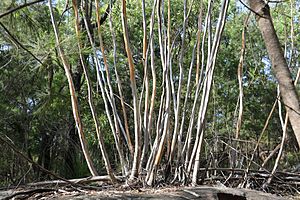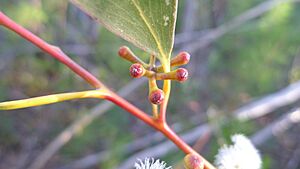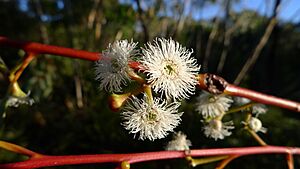Whipstick mallee ash facts for kids
Quick facts for kids Whipstick mallee ash |
|
|---|---|
 |
|
| Eucalyptus multicaulis in Garigal National Park | |
| Scientific classification |
|
| Kingdom: | Plantae |
| Clade: | Tracheophytes |
| Clade: | Angiosperms |
| Clade: | Eudicots |
| Clade: | Rosids |
| Order: | Myrtales |
| Family: | Myrtaceae |
| Genus: | Eucalyptus |
| Species: |
E. multicaulis
|
| Binomial name | |
| Eucalyptus multicaulis Blakey
|
|
| Script error: The function "autoWithCaption" does not exist. | |
Script error: No such module "Check for conflicting parameters".
The whipstick mallee ash (its scientific name is Eucalyptus multicaulis) is a special kind of plant. It's a mallee, which means it's a tree or shrub that grows many stems from its base. This plant is found only in New South Wales, Australia. It has smooth bark, long leaves, and white flowers.
What Does the Whipstick Mallee Ash Look Like?
The whipstick mallee ash is a mallee that usually grows up to about 8 meters (about 26 feet) tall. It has a special woody base called a lignotuber. This lignotuber helps the plant regrow after a fire.
Its bark is smooth and can be white or grey. Sometimes, the bark near the bottom of the stems is a bit rough.
- Young Leaves: When the plant is young, or after it regrows, its leaves are broadly egg-shaped. They are a bluish or greyish-green color. These young leaves are about 5 to 9.5 centimeters (2 to 3.7 inches) long and 2 to 4.5 centimeters (0.8 to 1.8 inches) wide. They have a short stalk called a petiole.
- Adult Leaves: The older, adult leaves are shaped like a spear or are slightly curved. They are shiny green on both sides. These leaves are about 7 to 15 centimeters (2.8 to 5.9 inches) long and 1.4 to 3 centimeters (0.5 to 1.2 inches) wide. Their petiole (stalk) is about 1 to 2 centimeters (0.4 to 0.8 inches) long.
The plant's flower buds grow in groups of seven to fifteen. They are found where the leaves meet the stem. Each group of buds sits on a stalk called a peduncle, which is about 1 to 1.6 centimeters (0.4 to 0.6 inches) long. Each individual bud has its own small stalk, called a pedicel, about 4 to 6 millimeters long.
Mature buds are oval or club-shaped. They are about 3 to 4 millimeters long and 3 millimeters wide. The top part of the bud, which covers the flower, is rounded. This cap is called an operculum.
The whipstick mallee ash flowers from September to November. Its flowers are white. After flowering, the plant produces woody, cone-shaped fruits. These fruits are called capsules. They are about 7 to 9 millimeters long and 6 to 8 millimeters wide.
How Did It Get Its Name?
The whipstick mallee ash was first officially described in 1927. A scientist named William Blakely gave it its scientific name, Eucalyptus multicaulis. He wrote about it in a science journal.
The name multicaulis comes from two Latin words:
- multi- means "many"
- caulis means "stem"
This name perfectly describes the plant's "mallee" habit. It has many stems growing from its base.
Where Does the Whipstick Mallee Ash Live?
The whipstick mallee ash grows on sandstone ridges. It is found in areas called mallee shrubland. These areas are like a type of bushland with many mallee plants.
You can find this plant in New South Wales, Australia. Its range stretches from east of Rylstone all the way to the Budawang Range.
 | Stephanie Wilson |
 | Charles Bolden |
 | Ronald McNair |
 | Frederick D. Gregory |



